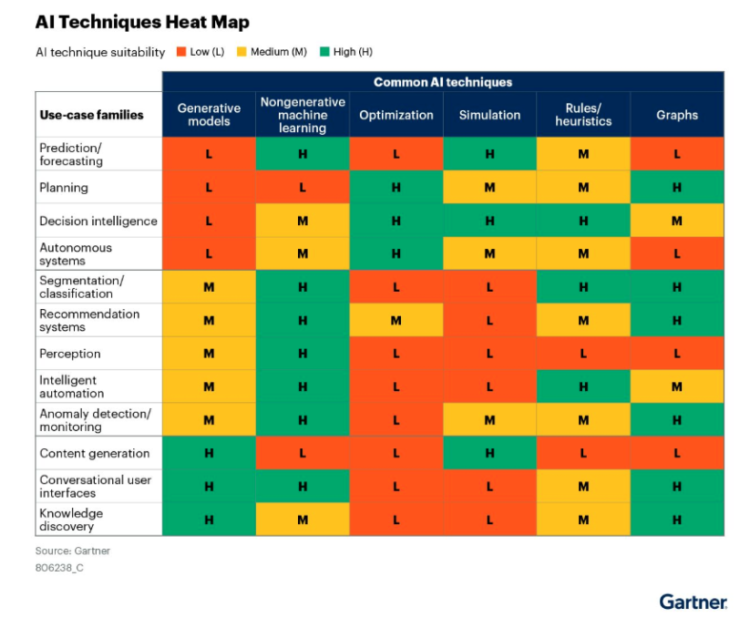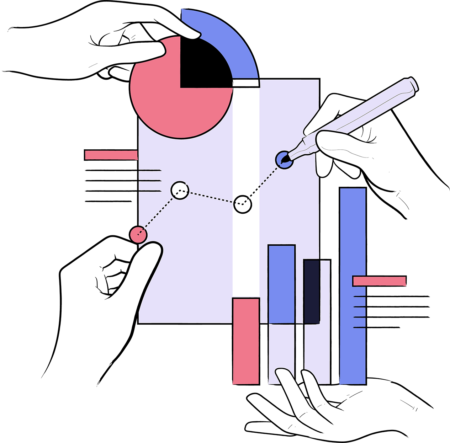



























































AI is a tool that requires proper processes
AI seems to be on the agenda of every manager and company today. ChatGPT, Gemini and Copilot brought generative AI (GenAI) to the public’s attention, but it’s worth remembering that AI is much more than that. We believe that for many companies, the most significant value of AI, at least not yet, comes not from generative AI, but more from process automation and data enrichment, such as learning models and heuristic algorithms that solve practical business problems efficiently. We call this logical AI.
But AI is a tool that needs reliable data and functioning processes around it.
Simply adopting technology will not give you a competitive advantage unless your business processes are genuinely designed to exploit and support its use. At its best, AI works alongside humans, deepening data understanding, situational awareness and supporting decision-making.
Gartner’s “AI Techniques Heat Map” matrix highlights the specialised strengths of AI technologies in different application areas. For example:
- Optimisation: best suited to solving complex, yet modelable problems where speed, regularity and predictability of results are essential. A good example is work prioritisation and scheduling or route optimisation.
- Heuristic rules: Prove to be very useful in the detection of autonomous systems and anomalies, where simplicity and speed are most critical. For example, determining shelf locations in a warehouse based on demand.
- Generative models: are at their best for content creation and the implementation of discussion-based interfaces, but are less useful for tasks such as optimisation or simulation.

Concrete benefits and examples
AI does not just automate – it complements human decision-making. At Dynamik, we have used AI to:
- To detect anomalies: AI can identify unprofitable customers or under-utilisation of resources and make recommendations, but leave the decision-making to humans.
- Correction of data errors: It finds incomplete data, such as incorrect fields or incomplete addresses, and suggests corrections.
- Data enrichment: AI can enrich the available data, such as estimating task durations based on historical data, predicting product demand, or combining separate orders to the same addresses into bundled deliveries. We also use AI-enriched data in our own sales efforts to find new customer prospects.
In the field of optimisation, cloud services and accelerated computing capacity make optimisation much more flexible and accessible, even for small businesses. Route optimisation, which used to require hours of computation, has become a matter of seconds and much more accurate. This allows for customised optimisation on a tighter cycle and even in real time without major investments.

True competitiveness comes from processes, not technology
The world’s most competitive companies, such as Tesla or Amazon, build their success on strong processes. The principles of lean thinking provide a simple but effective approach to process improvement:
- Question every claim – why is this step necessary?
- Remove unnecessary steps and focus on value-added activities.
- Simplify and optimise processes to support efficient operations.
- Increase transparency and responsiveness of processes.
- Automate when it adds value.
To support these steps, AI can bring significant benefits. For example, AI can identify process bottlenecks and suggest solutions, but the real competitive advantage will only come when an organisation uses the technology strategically as part of a holistic process improvement approach.

Artificial intelligence is today, not the future
AI is today, not the future. It is already in use in many business areas, providing solutions for process automation, optimisation and decision support. But building competitiveness requires more than technology – it requires processes that work and the right partner. Logical AI provides practical tools for optimising routes and resources, improving data quality and predicting anomalies. When technology is combined with clear processes and expert support, the result is solutions that streamline operations and create sustainable competitive advantage. The Dynamik team is ready to help you put AI into practice.